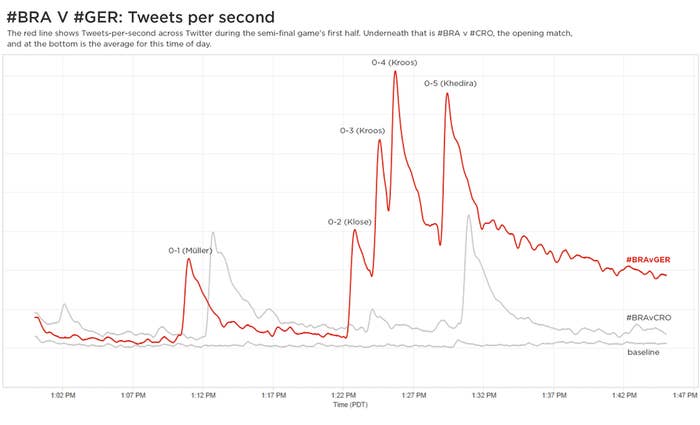
Even on Twitter — which is often the go-to service for conversations on the web surrounding sporting events — today's blowout World Cup match between Germany and Brazil was far from ordinary.
In the span of less than half an hour during the first half of its match with Brazil, the German men's national soccer team scored five consecutive unanswered goals. While it's typical to see a spike in Twitter activity whenever a team scores a goal, the unprecedented scoring blitz actually led to a sustained increase in usage across Twitter that continued well beyond the fifth unanswered goal, based on data provided by the company.
As shown in the chart above, the service's average tweets-per-second (or TPS, as the company refers to in shorthand) — which measures all conversations across Twitter, not just those about the World Cup — continued to spike higher after each of the team's goals until the fifth consecutive one. Twitter's usage beginning with the second goal was well ahead of not just Brazil's opening World Cup match, but the average Twitter activity across the entire World Cup. The German men's national team went on to win the match 7–1, with Brazil's lone goal occurring in the final minutes of the match.
And indeed, the conversation did continue — comprised of tweets about how the German men's national team was completely dismantling Brazil, which came in as a favorite to win the World Cup. The match set another record for Twitter in terms of the number of tweets sent for any sporting event, beating out the Super Bowl (during which 24.9 million tweets were sent).
With 35.6 million Tweets, #BRA v #GER is the most-discussed single sports game ever on Twitter. #WorldCup
Double-checking, but looks like per Elo ratings that was indeed the most unexpected scoreline in World Cup history.
Being able to handle such a deluge of information is a core part of Twitter's value proposition to both its users and its investors. Twitter's sales pitch to advertisers has been that it is where conversations around live events — such as television or sporting events — happen. And for that to work, Twitter has to be able to parse what can be up to hundreds of thousands of tweets coming in every second.
While the deluge was still likely below the company's record (a one-second peak fluke of more than 143,000 TPS during the airing of a film on Japanese television), the fire hose appears to have peaked in the tens of thousands of tweets per second. The daily average is around 5,700 Tweets per second, according to a blog post in August by the company.
The service, of course, was not always this stable, with Twitter's infamous "Fail Whale" popping up regularly during high-volume events like the previous World Cup. As part of its maturation into the company it is today, it had to re-architect its infrastructure, which led to a dramatic increase in the stability of the service.
Even for a company that excels at managing lots of data, a deluge of points coming in at roughly the same time — such as hundreds of thousands of tweets happening simultaneously — can still be challenging. That the service continued unfettered is a good sign for not only advertisers, but the investors that Twitter also has to appease now that it is a publicly traded company.
The Brazil-Chile match was previously the most-tweeted match in the 2014 World Cup.
#BRA v #CHI: the most-discussed moments of the match on Twitter #WorldCup
With 16.4 million Tweets, #BRA v #CHI is the most-discussed match of the #WorldCup so far
